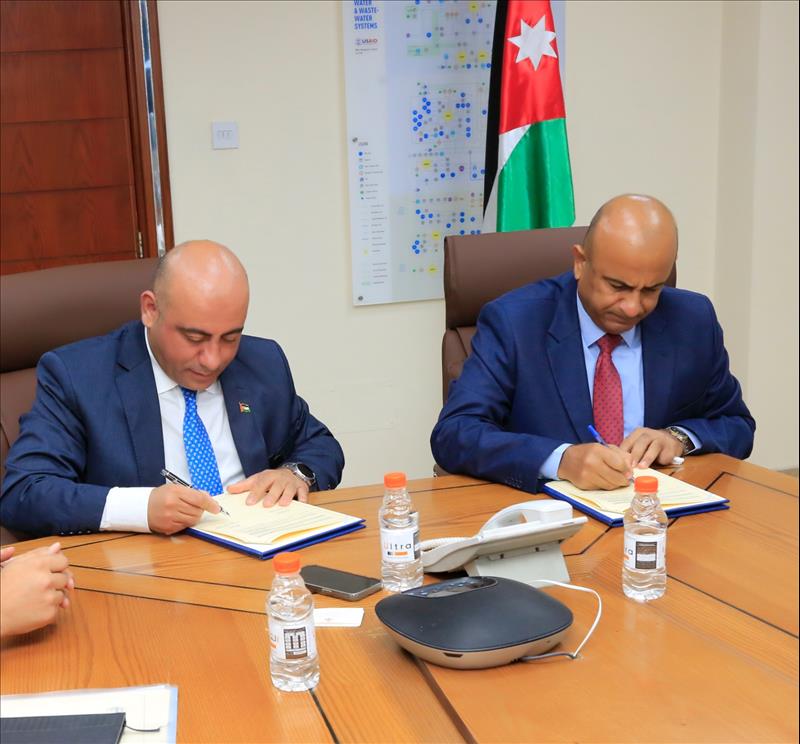
403
Sorry!!
Error! We're sorry, but the page you were looking for doesn't exist.
Water, Agriculture Ministries Sign Deal To Boost Treated Wastewater Use, Afforestation
(MENAFN- Jordan News Agency)
Amman, June 29 (Petra) – The Ministries of Water and Irrigation and Agriculture signed an agreement on Sunday to strengthen collaboration on the use of treated wastewater, aiming to improve the sustainability of water resources and expand green areas across the Kingdom.
In a statement, the Ministry of Water said the agreement aligns with government efforts to optimize non-conventional water resources and adapt to climate change, given limited freshwater supplies and growing environmental pressures.
Secretary General of the Water Authority, Sufyan Batayneh, described the agreement as a significant measure to substitute treated water for freshwater in agriculture, thereby reducing stress on drinking water reserves, enhancing water security, and supporting farmers and livestock breeders.
Batayneh noted that Jordan's water sector produces around 214 million cubic meters of treated water annually through 29 treatment plants nationwide. This water is mainly used for irrigating fodder crops and expanding green spaces. He emphasized that the agreement forms a key part of developing innovative, sustainable solutions to address climate change impacts.
He added that the agreement supports activities under the national initiative to plant 10 million trees and shrubs, including the use of 700 cubic meters of treated water daily from the Kufranja treatment plant to reforest the Kufranja and Rajab areas, strengthening their environmental and economic resilience.
Secretary General of the Ministry of Agriculture, Mohammed Hiyari, highlighted that the partnership marks further progress in the use of non-conventional water sources for fodder cultivation and reforestation. He stressed its role in increasing green cover, supporting local communities, and advancing sustainable development goals.
Hiyari explained that the agreement falls under the broader National Reforestation Project and National Plan for Sustainable Agriculture, adding that tree species will be selected to suit local conditions, with an emphasis on preserving and expanding existing forests.
Amman, June 29 (Petra) – The Ministries of Water and Irrigation and Agriculture signed an agreement on Sunday to strengthen collaboration on the use of treated wastewater, aiming to improve the sustainability of water resources and expand green areas across the Kingdom.
In a statement, the Ministry of Water said the agreement aligns with government efforts to optimize non-conventional water resources and adapt to climate change, given limited freshwater supplies and growing environmental pressures.
Secretary General of the Water Authority, Sufyan Batayneh, described the agreement as a significant measure to substitute treated water for freshwater in agriculture, thereby reducing stress on drinking water reserves, enhancing water security, and supporting farmers and livestock breeders.
Batayneh noted that Jordan's water sector produces around 214 million cubic meters of treated water annually through 29 treatment plants nationwide. This water is mainly used for irrigating fodder crops and expanding green spaces. He emphasized that the agreement forms a key part of developing innovative, sustainable solutions to address climate change impacts.
He added that the agreement supports activities under the national initiative to plant 10 million trees and shrubs, including the use of 700 cubic meters of treated water daily from the Kufranja treatment plant to reforest the Kufranja and Rajab areas, strengthening their environmental and economic resilience.
Secretary General of the Ministry of Agriculture, Mohammed Hiyari, highlighted that the partnership marks further progress in the use of non-conventional water sources for fodder cultivation and reforestation. He stressed its role in increasing green cover, supporting local communities, and advancing sustainable development goals.
Hiyari explained that the agreement falls under the broader National Reforestation Project and National Plan for Sustainable Agriculture, adding that tree species will be selected to suit local conditions, with an emphasis on preserving and expanding existing forests.

Legal Disclaimer:
MENAFN provides the
information “as is” without warranty of any kind. We do not accept
any responsibility or liability for the accuracy, content, images,
videos, licenses, completeness, legality, or reliability of the information
contained in this article. If you have any complaints or copyright
issues related to this article, kindly contact the provider above.


















Comments
No comment